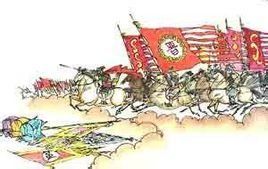成語解釋
【解釋】勢:氣勢,威力。形勢就像劈竹子,頭上幾節破開以後,下面各節順著刀勢就分開了。比喻作戰或工作節節勝利,毫無阻礙。
詞語辨析
【用 法】 主謂式;作謂語、定語、狀語;含褒義
【示 例】 宋·王懋《韓信之幸》:“其後以之取燕,以之拔齊,~,皆迎刃而解者。” 獨樂毅自引燕軍,長驅深入,所過宣諭威德,齊城皆望風而潰,勢如破竹,大軍直逼臨淄。 ★《東周列國志》第九十五回
【近義詞】勢不可當、所向披靡
、摧枯拉朽
【反義詞】 牢不可破、堅不可摧
典故
三國末年,晉武帝司馬炎滅掉蜀國,奪取魏國政權以後,準備出兵攻打東吳,實現統一全中國的願望。他召集文武大臣們商量滅大計。多數人認為,吳國還有一定實力,一舉消滅它恐怕不易,不如有了足夠的準備再說。
大將杜預不同意多數人的看法,寫了一道奏章給晉武帝。杜預認為,必須趁目前昊國衰弱,忙滅掉它,不然等它有了實力就很難打敗它了。司馬炎看了杜預的奏章,找自己的最信任的大臣張華徵求意見。張華很同意杜預的分析,也勸司馬炎快快攻打吳國,以免留下後患。於是司馬炎就下了決心,任命杜預作征南大將軍。
公元279年,晉武帝司馬炎調動了二十多萬兵馬,分成六路水陸並進,攻打吳國,一路戰鼓齊鳴,戰旗飄揚,戰士威武雄壯。第二年就攻占了江陵,斬了吳國一員大將,率領軍隊乘勝追擊。在沅江、湘江以南的吳軍聽到風聲嚇破了膽,紛紛打開城門投降。司馬炎下令讓杜預從小路向吳國國都建業進發。此時,有人擔心長江水勢暴漲,不如暫收兵等到冬天進攻更有利。杜預堅決反對退兵,他說:“現在趁士氣高漲,鬥志正旺,取得一個又一個勝利,勢如破竹(像用快刀劈竹子一樣,劈過幾節後竹子就迎刃破裂),一舉攻擊吳國不會再費多大力氣了!”晉朝大軍在杜預率領下,直衝向吳都建業,不久就攻占建業滅了吳國。晉武帝統一了全國。
公元279年,晉武帝司馬炎調動了二十多萬兵馬,分成六路水陸並進,攻打吳國,一路戰鼓齊鳴,戰旗飄揚,戰士威武雄壯。第二年就攻占了江陵,斬了吳國一員大將,率領軍隊乘勝追擊。在沅江、湘江以南的吳軍聽到風聲嚇破了膽,紛紛打開城門投降。司馬炎下令讓杜預從小路向吳國國都建業進發。此時,有人擔心長江水勢暴漲,不如暫收兵等到冬天進攻更有利。杜預堅決反對退兵,他說:“現在趁士氣高漲,鬥志正旺,取得一個又一個勝利,勢如破竹(像用快刀劈竹子一樣,劈過幾節後竹子就迎刃破裂),一舉攻擊吳國不會再費多大力氣了!” 晉朝大軍在杜預率領下,直衝向吳都建業,不久就攻占建業滅了吳國。晉武帝統一了全國。
故事出自《晉書·杜預傳》。成語“勢如破竹”,形容戰鬥節節勝利,毫無阻擋。
故事翻譯
【文言文】
杜預向江陵,王渾出橫江,攻吳鎮戍,所向皆克。杜預與眾軍會議,或曰:“百年之寇,未可盡克。方春水生,難於久駐。宜俟來冬,更為大舉。”預曰:“昔樂毅借濟西一戰,以並強齊。今兵威已振,譬如破竹,數節之後,皆迎刃而解,無復著手處也。”遂指授群帥方略,徑造建業。
【白話文翻譯】
杜預向江陵進發,王渾從橫江出兵,攻打吳的兵鎮及邊防營壘,攻無不克。杜預與眾將領議事,有人說:“百年的寇賊,不可能一下子徹底消滅,現在正是春季,有雨水,軍隊難以長時間駐紮,最好等到冬季來臨,再大舉發兵。”杜預說:“從前,樂毅憑藉濟西一伏而一舉吞併了強大的齊國。目前,我軍兵威已振,這就好比破竹,破開數節之後,就都迎刃而解了,不會再有吃力的地方了。”於是,指點傳授眾將領計策謀略,部隊一直到了建業。
相關內容
【英 語】
Like Splitting a Bamboo
In the last years of the Three Kingdoms period,Sima Yan conquered the Kingdom of Shu and seized the state power of the Kingdom of Wei, and became Emperor Wudi of the Jin Dynasty. Then he planned to send his troops to attack the Kingdom of Wu so as to unify China. He called his civil and military officials to discuss the plan to destroy the Kingdom of Wu. Most of the them thought that it would be difficult to try to destroy the Kingdom of Wu with one action because the Kingdom of Wu was still powerfou. So it would be better to wait until fuller preparations were made. However,General Du Yu did not agree with them, so he wrote a memorial to the throne. According to Du Yu, it would be better to destroy the Kingdom of Wu as soon as possible, because it was still weak at that time. It would be more difficult to defeat the Kingdom of Wu later if it became stronger. After reading it, Emperor Wudi to send troops to attack the Kingdom of Wu as early as possible, so as to avoid future trouble. So Emperor Wudi made up his mind, and
appointed Du Yu the Grand General for Conquering the south . In 279, sima Yan, Emperor Wudi of the Jin Dynasty, mustered more than two hundred thousand troops who were divided into six army divisions to proceed by both land and water to attack the kingdom of Wu. Battle drums thundering and the colours fluttering, the soldiers were full of power and grandeur. The next day, Jiangling city was captured, and a general of the Kingdom of Wu was killed. And the Jin army pushed on in the flush of victory. Hearing this, the troops of the Kingdom of Wu south of the Yuanjiang River and the Xiangjiang River were overwhelmed with fear, and they opened the gates of cities and surrendered one after another. Sima Yan ordered Du Yu to advance to Jianye, capital city of the Kingdom of Wu, by water.Someone feared that the Yangtze River might have a sharp rise and thought it more advantageous to withdraw the troops for the time being and wait until winter came. Du Yu resolutely opposed the idea, saying ," Now our army's morale is high,and our army is winning one victory after another, just like a sharp knife splitting a bamboo. It won't be too strenuous to conquer the Kingdom of Wu with one action. " Under Du Yu's command , the Jin army charged at the capital city Jianye, occupied it ,and thus destroyed the Kingdom of wu. In this way, Emperor Wudi of the Jin Dynasty unified the whole country. This story appears in "The Life of Du Yu "in The History of the Jin Dynasty. Later the set phrase" like splitting a bamboo" is used to refer to irresistible force or victorious advance.

